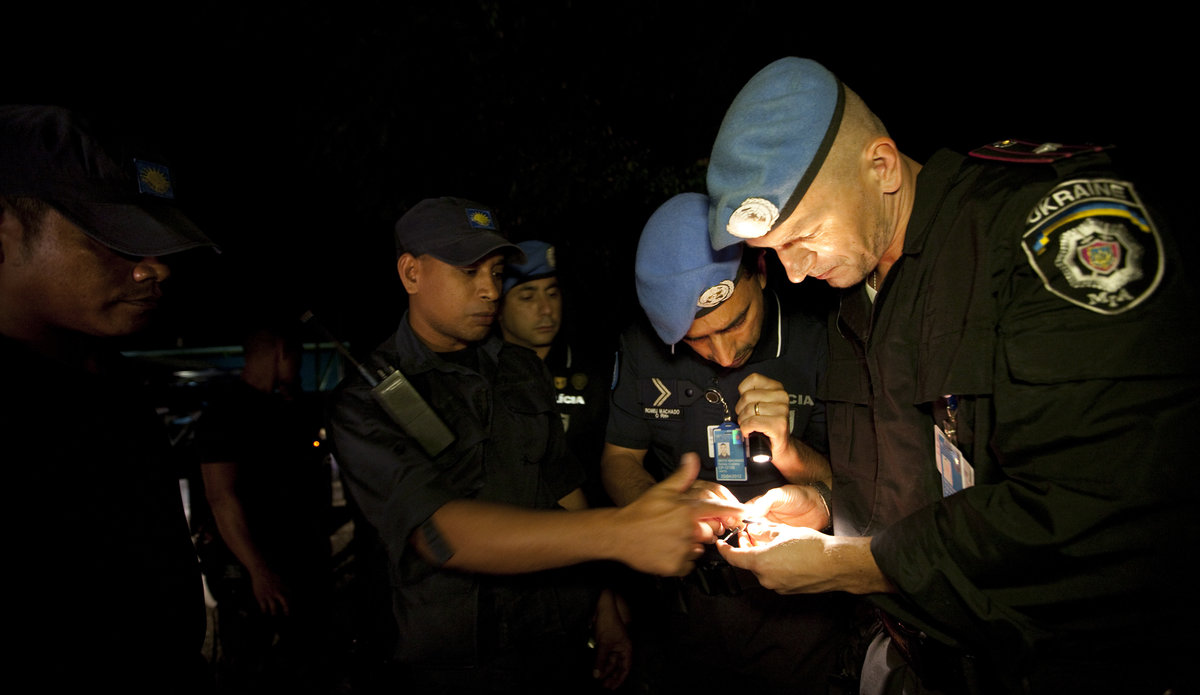Organized crime is often both a product of and contributor to conflict in vulnerable states. The United Nations recognizes the grave threat it poses to mandate implementation, mission effectiveness, and the safety and security of United Nations personnel and facilities and host-State communities. The United Nations Police Division has been tasked with providing technical expertise and assistance to national police and law enforcement institutions in post-conflict settings to prevent, disrupt and dismantle organized criminal activities, including drug trafficking, human trafficking, firearms trafficking and exploitation of natural resources.
The United Nations Police Division works closely with the United Nations Office on Drugs and Crime (UNODC), the International Criminal Police Organization (INTERPOL), regional groupings such as the African Union (AU), Economic Community of West African States (ECOWAS), European Union (EU) and Member States to design effective and sustainable strategies that will help to better protect transitional societies from this scourge. Two of the Police Division’s main activities in this area are the Transnational Threats Project and the West African Coast Initiative.
Transnational Threats (TNT) Project
The TNT Project being led by the Police Division Serious and Organized Crime (SOC) Team aims to enable United Nations field missions to better address transnational threats, including serious and organized crime, corruption and violent extremism. Given the growing recognition of the risk posed by TNT—as highlighted by Statements by the President of the Security Council (2010/4 and 2012/29), Security Council Resolution 2185 (2014), the report of the High-Level Independent Panel on Peace Operations (2015) and the Secretary-General’s report on United Nations policing (2016)—the role of UNPOL in strengthening host-State police capacity to address these challenges has become even more critical. Greater capacity at UN Headquarters and in field missions to respond to TNT would increase the safety and security of UN personnel and facilities and contribute to the implementation of mandates.
To date, the project has focused on three short-term deliverables:
- Develop policy, guidance, templates, training and expertise on integrating transnational organized crime and other threats into all levels of mission information collection, threat analysis, planning and training, including through partnerships;
- Establish criminal information and analysis capabilities, including the use of new technologies to focus on transnational organized crime, including in dangerous urban environments, and border security; and
- Deploy specialists and/or specialized teams and tools to peacekeeping operations for building the capacity of host States in preventing and countering transnational threats.
A key achievement to date is the formation of an active Crime Intelligence Virtual Working Group (CIVWG) to gather the knowledge and expertise of field-based practitioners on the establishment of crime intelligence structures in missions and the development of related guidance materials. The project has also led to the creation of a network of Serious and Organized Crime Focal Points in missions and from strategic partners such as UNODC and INTERPOL to serve as a hub for SOC resources and activities and as a platform for the exchange of expertise, lessons learned and good practices for the UN and among the wider law enforcement community. In the Central African Republic, the capacity of the INTERPOL National Central Bureau (NCB) to support host-state law enforcement agencies and UNPOL in addressing TNT was reinforced through the revitalization of the office’s technical infrastructure and training for 15 CAR and UNPOL officers on INTERPOL tools and services, in conjunction with the UN Multidimensional Integrated Stabilization Mission in the Central African Republic (MINUSCA).
The TNT Project is being implemented through the DPKO-DFS Uniformed Capabilities Development Agenda, which aims to enhance uniformed police and military capabilities within missions in support of the effective implementation of mandated tasks, incorporating both operational activities and capacity development support to host-state institutions.

